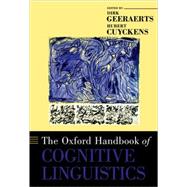- ISBN: 9780195143782 | 0195143787
- Cover: Hardcover
- Copyright: 11/16/2007
In the past decade, Cognitive Linguistics has developed into one of the most dynamic and attractive frameworks within theoretical and descriptive linguistics The Oxford Handbook of Cognitive Linguistics is a major new reference that presents a comprehensive overview of the main theoreticalconcepts and descriptive/theoretical models of Cognitive Linguistics, and covers its various subfields, theoretical as well as applied. The first twenty chapters give readers the opportunity to acquire a thorough knowledge of the fundamental analytic concepts and descriptive models of Cognitive Linguistics and their background. The book starts with a set of chapters discussing different conceptual phenomena that are recognized askey concepts in Cognitive Linguistics: prototypicality, metaphor, metonymy, embodiment, perspectivization, mental spaces, etc. A second set of chapters deals with Cognitive Grammar, Construction Grammar, and Word Grammar, which, each in their own way, bring together the basic concepts into aparticular theory of grammar and a specific model for the description of grammatical phenomena. Special attention is given to the interrelation between Cognitive and Construction Grammar. A third set of chapters compares Cognitive Linguistics with other forms of linguistic research (functionallinguistics, autonomous linguistics, and the history of linguistics), thus giving a readers a better grip on the position of Cognitive Linguistics within the landscape of linguistics at large. The remaining chapters apply these basic notions to various more specific linguistic domains, illustrating how Cognitive Linguistics deals with the traditional linguistic subdomains (phonology, morphology, lexicon, syntax, text and discourse), and demonstrating how it handles linguistic variationand change. Finally they consider its importance in the domain of Applied Linguistics, and look at interdisciplinary links with research fields such as philosophy and psychology. With a well-known cast of contributors from around the world, this reference work will be of interest to researchers and advanced students in (cognitive) linguistics, psychology, cognitive science, and anthropology.







